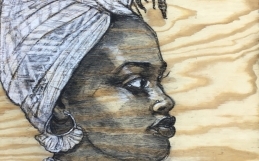Listening to Life
By Hailey Stangebye
Photos by Kenny Williams
KMB can hear an entire album in the cozy corners of a silent room.
Between the fibers of a worn carpet and a shelf of books he can trace melodies and beats. It’s not the result of years of musical theory training. For KMB, connecting one chord to another is as spontaneous as breath.
“I’ve made songs where I just hear a bird, and then I take that idea and make an entire song out of it,” KMB says. “Sometimes silence is inspirational. If you really listen and adapt to a space, a feeling, a mood, then you can do anything.”
“Sometimes silence is inspirational. If you really listen and adapt to a space, a feeling, a mood, then you can do anything.”
KMB drifted toward music from the time he was a child. At the age of 3, he would sit with his brother and play a computer game where they could create their own, unique beats.

“I didn’t even realize what I was doing. It was just fun,” KMB says. “My brother would make slower songs and my songs were the max bpm that you could go to — 120. I don’t know why. I just loved making fast songs. I still have a bunch of songs from that program.”
KMB continued to play that game until his creativity outgrew the program’s capacity. At 8 years old, KMB became frustrated with the games limitations. He couldn’t create the beats that he heard in his head. The software was too simple.
One day, KMB came home and found his dad installing a new program on their family computer.
“I gravitated toward my dad, so anytime he was doing something I’d always be on my knees next to him watching,” KMB says.
His dad explained that the program, an audio software called FL, was a gift from a coworker.
“He opens it up and I look at it and I’m like, ‘What do I do?’ It was just a bunch of buttons. I didn’t know what it was,” KMB says. “And he was like, ‘Just play around with it. I’m about to go to the grocery store. I’ll be right back.’ And then, when he came back, I had my first beat ready. Ever since then, I just haven’t been the same.”
“And he was like, ‘Just play around with it. I’m about to go to the grocery store. I’ll be right back.’ And then, when he came back, I had my first beat ready. Ever since then, I just haven’t been the same.”
In those early days, KMB would make three — sometimes five — songs in a single day. Nowadays, inspiration can be a little more fickle and tricky to grasp. KMB says that it’s easy to get swept up in what’s trending and making money.
When he focuses on immediate popularity, it’s a recipe for writer’s block.

“I came to the realization that I should go back to how I started,” KMB says. “If people love it, cool. If they don’t, that’s okay. When I started it was fun and it was fun to do. Once I realized that, everything just started to flow. People started to say that I have my own sound and this and that. The love started to come after that.”
KMB knows that his music is on the right track when he sees and talks to his fans. Sometimes, he can make a connection with a listener through music that he couldn’t have made through conversation. Music transcends language and space barriers.
He’ll never forget a message he received from a fan in Portugal.
“He was thinking about killing himself and listening to my music made him change his mind. At that point, I was shook up,” KMB says. “I told him that I was grateful for him. That he deserves to be here. Just trying to uplift him and pretty much thank him for even listening. He told me that he was eternally grateful for me making music and I almost cried. I didn’t know how to feel.”
“I told him that I was grateful for him. That he deserves to be here. Just trying to uplift him and pretty much thank him for even listening. He told me that he was eternally grateful for me making music and I almost cried.”
KMB brings that deep sense of gratitude to everything he creates. He says that he will always be happy, he will always be grateful and he will never take what he does for granted. KMB will always make music.






